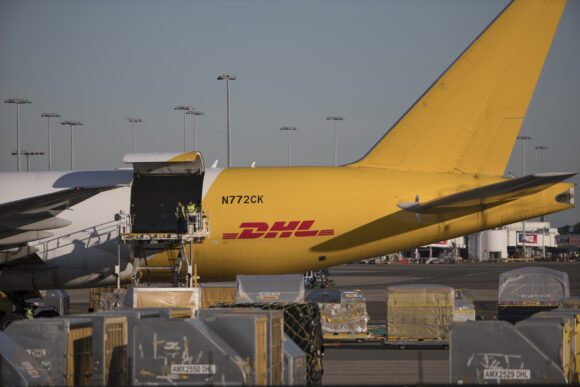Postal services across the world are suspending parcel deliveries to the US, citing confusion about how to process millions of low-value packages that will lose their duty-free treatment next week.
As of Aug. 29, President Donald Trump is ending the so-called de minimis exemption that has applied to more than 4 million parcels flowing through the US each day, driven largely by e-commerce.
Under the new regime, which started with China and Hong Kong in May, goods mailed from other countries will be subject to tariffs and compliance with US Customs and Border Protection rules. Verifiable gifts valued at less than $100 will remain duty-free, according to the White House.

In response to the changes, a growing number of national mail services are pausing some services to the US as soon as this week, blaming a lack of clarity from US authorities on how the duties will be collected and how to submit required data.
In Asia, Korea Post said it will halt accepting air parcels and some express mail services to the US starting Tuesday, while keeping premium services, operated via private couriers, available subject to customs duties.
Similarly, Singapore’s SingPost will suspend standard services for commercial shipments to America from Monday, with Speedpost’s Express and Direct International Service available to retail and corporate customers, respectively.
Japan warned of potential delays or returned parcels because of the changes, with authorities vowing to share more information when available.
European postal services also made adjustments in light of the changes, with several suspending shipments. Norway and Finland’s mail carriers both said their stoppages begin Saturday.
‘Key Questions’
The service interruptions highlight the seismic impact from Trump’s decision to eliminate the de minimis exemption and raise concerns that cheap goods — especially those from China — will flood into other economies given the new barriers in the US.
Deutsche Post and DHL Parcel Germany are also temporarily suspending “the acceptance and transport of business customer parcels via the postal network to the US.” DHL Express service remains available.
“Key questions remain unresolved, particularly regarding how and by whom customs duties will be collected in the future, what additional data will be required, and how the data transmission to the US Customs and Border Protection will be carried out,” DHL said in a statement Friday.
The Czech Republic has halted US-bound parcels, while Austria’s postal provider will stop accepting them after Aug. 25, citing the changes. Belgium’s Bpost will reportedly pause shipments from Friday due to regulatory uncertainty.
The UK’s Royal Mail plans a brief suspension for business account customers next week to implement a revised system for handling the newly imposed duties.
Australia Post has temporarily suspended its transit service deliveries — a small number of items from third countries sent through Australia to the US, a spokesperson confirmed. However, regular direct deliveries between the two countries will be unaffected.
Lufthansa Cargo said it would no longer accept airmail shipments to the US starting Aug. 25, though general cargo and further cargo types will not be affected.
“We are working intensively to find a viable solution that will enable us to resume airmail transport to the United States in the future,” a company spokeswoman said.
There are no plans to push back the Aug. 29 deadline, according to a Trump administration official, who added that CBP sent out a memo clarifying the policy to foreign postal operators.
‘Real Concern’
Washington’s long-standing de minimis policy had allowed parcels packed with cheap items to flow into the US from around the world with little interruption or oversight, fueled by consumer demand for bargains and immediacy. Trump’s White House claims it’s a loophole used to evade tariffs and funnel illegal drugs.
Now, postal services, online sellers, consumers and shipping companies are attempting to sort through the costly and complicated process to comply with US rules with little guidance from federal agencies.
“It is a real concern that the dominoes are falling and there will be a ripple effect where more and more posts announce that they will be suspending packages to the US,” said Kate Muth, executive director of the International Mailers Advisory Group, which represents the US international mailing and shipping industry.
Once the exemption ends, duties will be assessed on US imports shipped by mail based on the country-of-origin tariff rate that Trump imposed using his emergency powers. Alternatively, packages shipped via international post could be assessed with a temporary flat fee of $80 to $200 per item, but only for the next six months.
CBP outlined in an Aug. 15 bulletin how the flat fees would be calculated, corresponding to the countries’ tariff rates. The agency also offered some additional instruction to shippers on Thursday, when it issued guidance certifying two companies to collect and pay duties on behalf of international mail carriers.
“It’s obviously very welcomed,” Muth said, “but it’s still a concern that we’re just a week away and we only have the first two approved.”
The fallout is extending beyond mail carriers. Starting Aug. 25, online marketplace Etsy Inc. plans to suspend its shipping label service for national mail services in Australia, Canada and the UK for US-bound packages, according to its website.
The company suggested that shippers use carriers with services in place that allow them to pay duties before goods arrive in the US, such as United Parcel Service Inc. and FedEx Corp.
FedEx said it continues to accept and transport shipments to the US and is unaffected by the postal operators’ decisions. UPS had no immediate comment. The US Postal Service didn’t immediately respond to a request for comment.
Top photograph: Cargo is offloaded from an aircraft operated by DHL at Sydney Airport in Sydney, Australia. Photo credit: Brent Lewin/Bloomberg
Topics USA
Was this article valuable?
Here are more articles you may enjoy.



 Trump’s EPA Rollbacks Will Reverberate for ‘Decades’
Trump’s EPA Rollbacks Will Reverberate for ‘Decades’  Fingerprints, Background Checks for Florida Insurance Execs, Directors, Stockholders?
Fingerprints, Background Checks for Florida Insurance Execs, Directors, Stockholders?  ‘Structural Shift’ Occurring in California Surplus Lines
‘Structural Shift’ Occurring in California Surplus Lines  A 10-Year Wait for Autonomous Vehicles to Impact Insurers, Says Fitch
A 10-Year Wait for Autonomous Vehicles to Impact Insurers, Says Fitch 

